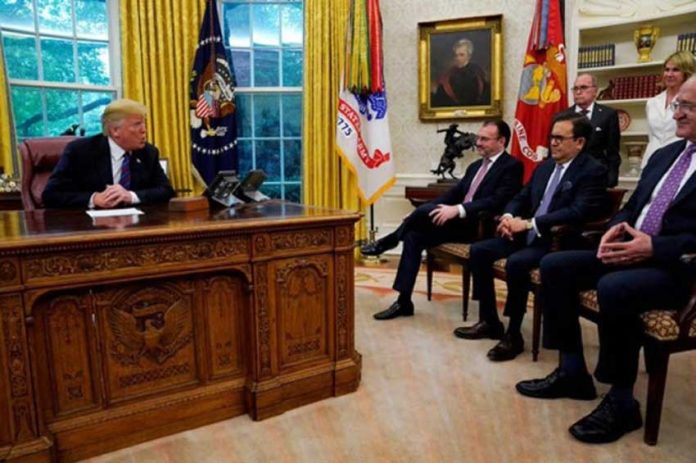President-elect Andrés Manuel López Obrador was among a range of stakeholders in Mexico who welcomed yesterday’s announcement of a bilateral trade deal with the United States, although he and others stressed that Canada should also be included in the updated agreement.
López Obrador was particularly pleased that the deal preserved Mexico’s sovereignty in the energy sector.
“We put the emphasis on defending national sovereignty on the energy issue and it was achieved,” he told reporters in Chiapas.
“We are satisfied because our sovereignty was saved. Mexico reserves the right to reform its constitution, its energy laws, and it was established that Mexico’s oil and natural resources belong to our nation.”
News agency Blomberg reported last week that Jesús Seade, López Obrador’s nominee to be his chief trade representative, had asked the Trump administration to address concerns that language proposed for a new deal would place too many restrictions on how Mexico can treat foreign companies seeking to explore and drill for oil in national waters.
López Obrador said Trump “understood our position” but charged that “it’s important that Canada also be included” in the deal, describing the agreement with the United States as a first step.
“We’re very interested in it remaining a three-country deal,” he said. “The free-trade agreement should remain as it was originally conceived.”
United States President Donald Trump said yesterday that Canada could be excluded from the deal if it didn’t “negotiate fairly.”
López Obrador, who will be sworn in as president December 1, added: “We also take a favorable view of the fact that salaries have been increased in the auto industry.”
Reactions of financial analysts and members of the private sector to the announcement of the Mexico-U.S. agreement were also largely positive.
Carlos Serrano, chief economist for Mexico’s largest bank, BBVA Bancomer, said the agreement is “positive for both countries,” describing it as “fundamental for Mexico” and noting that the United States is the country’s biggest source of direct foreign investment and largest export market.
He also said that it reduced uncertainty and risk for Mexico’s manufacturing sector but added that Canada’s inclusion was desirable because “it would enhance the scope and depth of the treaty.”
Approval of the agreement by the congresses of both Mexico and the United States would provide more certainty in the medium to long term, Serrano said.
Economic analysts at Banorte also described the agreement as “positive” although the bank said that the “high wage area” provision, which stipulates that 40% to 45% of cars must be made by workers earning at least US $16 per hour, could reduce Mexico’s competitiveness.
Juan Pablo Castañón, president of the influential Business Coordinating Council (CCE), said that overall it was a good deal for Mexico because it will help to generate high-tech jobs and attract new investment from around the world.
However, he added that maintaining a trilateral agreement was important to boost synergy between automotive, aerospace and energy companies operating in the North American market.
“Canada will enter the negotiations today and if everything goes well, an agreement in principle between the three countries could be announced Friday, signed in November and then subjected to the legislature of each nation for approval and put into operation in April or May,” Castañón said.
CCE international trade official Moises Kalach also said the agreement should be trilateral, but both businessmen stressed that the negotiation process was not yet over.
Another powerful business sector voice that praised the agreement was that of the president of the Confederation of Industrial Chambers (Concamin).
“Great day for Mexico today, due to the completion of a long NAFTA renegotiation. The industrial sector expresses its satisfaction for the agreement reached with the United States. The agreement contains the provisions for fair trade and means a guarantee of greater investment for our country,” Francisco Cervantes Díaz said in a statement.
However, he also said the goal now was to bring Canada into the deal in order for the 24-year-old trilateral pact to continue.
Negotiations aimed at reaching agreement with Canada are taking place in Washington D.C. today and are to continue this week with the hope of meeting a Friday deadline.
Canadian Prime Minister Justin Trudeau said today “there has been some very positive progress, especially on autos” but also stressed that he would continue to defend the supply management system that protects Canadian farmers.
Canada looked forward to signing a deal as long as it was good for Canadians, he added.
Source: El Financiero (sp), El Economista (sp), Milenio (sp), Sin Embargo (sp)
